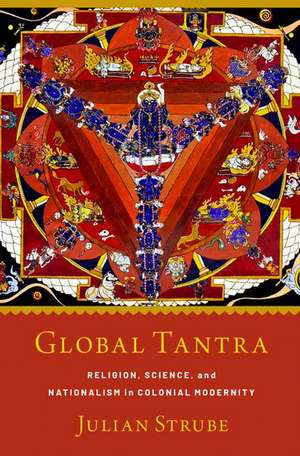Global Tantra: AAR Religion, Culture, and History
Autor Julian Strubeen Limba Engleză Hardback – 24 aug 2022
Preț: 561.42 lei
Preț vechi: 640.42 lei
-12% Nou
Puncte Express: 842
Preț estimativ în valută:
107.46€ • 111.76$ • 90.05£
107.46€ • 111.76$ • 90.05£
Carte disponibilă
Livrare economică 10-17 februarie
Preluare comenzi: 021 569.72.76
Specificații
ISBN-13: 9780197627112
ISBN-10: 0197627110
Pagini: 358
Ilustrații: 2 bw halftone
Dimensiuni: 242 x 164 x 31 mm
Greutate: 0.74 kg
Editura: Oxford University Press
Colecția OUP USA
Seria AAR Religion, Culture, and History
Locul publicării:New York, United States
ISBN-10: 0197627110
Pagini: 358
Ilustrații: 2 bw halftone
Dimensiuni: 242 x 164 x 31 mm
Greutate: 0.74 kg
Editura: Oxford University Press
Colecția OUP USA
Seria AAR Religion, Culture, and History
Locul publicării:New York, United States
Recenzii
Global Tantra is an important and original book that shows the complex exchanges and entanglements between East and West that helped shape the modern category of "Tantra." Strube sheds new light on the key role played by movements such as the Theosophical Society and authors such as John Woodroffe and his Indian collaborators. The book should be of real interest both to general readers and to scholars of religious studies, South Asian studies, globalization studies, and other disciplines.
In Julian Strube's delightful book, the modern manifestations of Tantra shimmer like beads of dew on a sun-drenched spiderweb; the critical eye wanders and wonders in turn. Here are the Theosophists, there are the Spiritualists; now the Orientalists, then the Brahmos; look at the Mesmerists and the Aryas, the nationalists and the feminist emancipators; Oxford comparativists and their neglected counterparts in Bengal's district towns. But wait, Global Tantra also reminds us that Indra's Net is an illusion. To look for modern Tantra you will have to look elsewhere, again and again.
Julian Strube's reconstruction of Tantra in colonial Bengal offers fascinating new vistas of the recent religious history of the Indian subcontinent. It places the debates on Tantra in a global context by thoroughly investigating Bengali and English sources side by side with all their internal implications and international ramifications. Further throwing open the black box called Arthur Avalon, Strube redistributes agency among Bengali and international players, making the story more Bengali and more global at the same time. This book, in its unpretentious and appealing style, has the potential to lift the state of the art in the colonial history of Tantra to a new level.
In Julian Strube's delightful book, the modern manifestations of Tantra shimmer like beads of dew on a sun-drenched spiderweb; the critical eye wanders and wonders in turn. Here are the Theosophists, there are the Spiritualists; now the Orientalists, then the Brahmos; look at the Mesmerists and the Aryas, the nationalists and the feminist emancipators; Oxford comparativists and their neglected counterparts in Bengal's district towns. But wait, Global Tantra also reminds us that Indra's Net is an illusion. To look for modern Tantra you will have to look elsewhere, again and again.
Julian Strube's reconstruction of Tantra in colonial Bengal offers fascinating new vistas of the recent religious history of the Indian subcontinent. It places the debates on Tantra in a global context by thoroughly investigating Bengali and English sources side by side with all their internal implications and international ramifications. Further throwing open the black box called Arthur Avalon, Strube redistributes agency among Bengali and international players, making the story more Bengali and more global at the same time. This book, in its unpretentious and appealing style, has the potential to lift the state of the art in the colonial history of Tantra to a new level.
Notă biografică
Julian Strube is Assistant Professor of Religious Studies at the University of Vienna. His work focuses on the relationship between religion, science, and politics since the nineteenth century from a global history perspective, concentrating on exchanges between Indian and Western intellectuals. His publications include Socialism, Catholicism, and Occultism in Nineteenth Century France, New Approaches to the Study of Esotericism (with Egil Asprem), and Theosophy across Boundaries (with Hans Martin Krämer).












